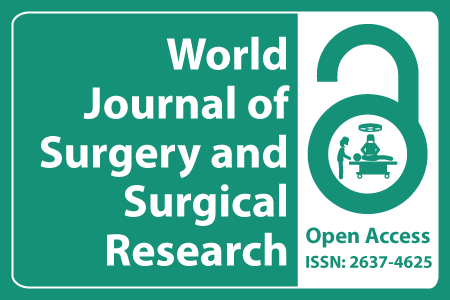
Journal Basic Info
- Impact Factor: 1.989**
- H-Index: 6
- ISSN: 2637-4625
- DOI: 10.25107/2637-4625
Major Scope
- Aesthetic & Cosmetic Surgery
- Vascular Surgery
- Surgery & Surgical Research
- Cardiovascular Surgery
- Robotic Surgery
- General Surgery
- Oral & Maxillofacial Surgery
- Cancer Surgery
Abstract
Citation: World J Surg Surg Res. 2021;4(1):1343.DOI: 10.25107/2637-4625.1343
COVID-19 Vaccination - Acceptance, Realization and Adverse Effects in an Orthopedic Hospital
Stephan Vogt1 *, Rainer Litz1 , Andreas Forth1 , Thilo Bausback1 , Vera-Maria Hosek1 and Maximilian Haenle1,2
Department of Orthopedic Surgery, Hessing Foundation Augsburg, Augsburg, Germany 2 Department of Orthopedic, University of Rostock, Rostock, Germany
*Correspondance to: Stephan Vogt
PDF Full Text Research Article | Open Access
Abstract:
Background: Since its first report in 2019 the SARS-CoV-2 pandemic has spread from Wuhan, China across the globe with a major impact on daily and social life, education, health care and economic growth. Since the development and availability of COVID-19 vaccine it is believed that community immunity may be achieved. Material and Methods: BioNTech/Pfizers’ vaccine Corminaty® was offered to all employees of a specialized 54 orthopedic hospital (Hessing Foundation, Augsburg, Germany). A questionnaire was established to document all adverse events and satisfaction with the vaccination regimen. Results: 55.2% of the hospitals employees agreed to get vaccinated. With 98.7% the highest acceptance of the vaccine was found in the group of physicians, whereas the lowest acceptance of the vaccine was found in the group of housekeeping staff and medical functional service with only 25.7% respectively 25.5% being vaccinated. The questionnaire had a completion rate of 75.2%. No severe adverse effects were noted. Adverse effects were described to be mild to moderate. Local pain at injection site was more often reported after the first vaccination whereas general symptoms like fatigue, muscle pain and headache were predominant after the second vaccination. Satisfaction with the vaccination protocol and realization was 97.1%. 95.3% of employees vaccinated would agree to get vaccinated again. Discussion: Our findings support previously published data that COVID-19 acceptance is associated with higher education and income, whereas younger females of lower education and income are less likely to accept vaccination. Serious adverse effects were absent and mild to moderate adverse effects tend to be more distinct after the second vaccination with Corminaty®. Conclusion: An effective vaccination protocol can be established at a specialized orthopedic hospital. Despite care for patients’ affected by COVID-19 disease acceptance of COVID-19 vaccination of the employees of the specialized orthopedic hospital was comparable to the general population. Further efforts must therefore be taken to address social inequalities in vaccine hesitancy.
Keywords:
COVID-19; Vaccination; Adverse effects; Acceptance; Orthopedic hospital
Cite the Article:
Vogt S, Litz R, Forth A, Bausback T, Hosek V-M, Haenle M. COVID-19 Vaccination - Acceptance, Realization and Adverse Effects in an Orthopedic Hospital. World J Surg Surgical Res. 2021; 4: 1343..













